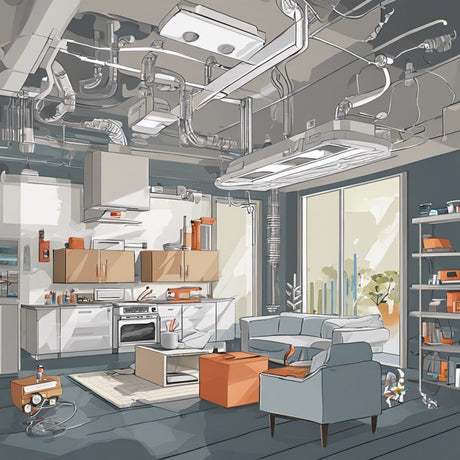- No products in the cart.
The Science of Indoor Air Quality: Enhancing Your Home with HVAC Installation
19
Feb
Introduction: The air we breathe indoors significantly impacts our health, comfort, and overall well-being. With the majority of our time spent indoors, it's crucial to understand the science of indoor air quality (IAQ) and how HVAC (Heating, Ventilation, and Air Conditioning) installation can play a pivotal role in enhancing the air we breathe at home. In this article, we delve into the science behind IAQ and explore how strategic HVAC installation can elevate the quality of air in your home.
-
Understanding Indoor Air Quality (IAQ): Indoor air quality refers to the cleanliness and healthiness of the air inside a building or enclosed space. It encompasses various factors such as airborne pollutants, humidity levels, temperature, and ventilation. Poor IAQ can lead to respiratory issues, allergies, discomfort, and reduced productivity, highlighting the importance of maintaining optimal air quality indoors.
-
The Role of HVAC Systems: HVAC systems are designed to regulate indoor temperature, humidity, and airflow while filtering out pollutants and contaminants from the air. Through a combination of heating, cooling, ventilation, and air filtration, HVAC systems create a comfortable and healthy indoor environment for occupants. Proper HVAC installation is essential for maximizing system performance and enhancing IAQ.
-
Air Filtration and Purification: One of the primary functions of HVAC systems is air filtration, which involves removing airborne particles, allergens, and pollutants from the air. High-efficiency air filters capture dust, pollen, pet dander, mold spores, and other contaminants, preventing them from circulating throughout the home. Additionally, advanced air purification technologies such as UVGI (Ultraviolet Germicidal Irradiation) systems can eliminate bacteria, viruses, and pathogens from the air, further enhancing IAQ.
-
Ventilation and Air Circulation: Proper ventilation is crucial for maintaining fresh air circulation and preventing the buildup of indoor pollutants. HVAC systems incorporate ventilation components such as exhaust fans, air vents, and ductwork to remove stale air and introduce fresh outdoor air into the living space. Strategic HVAC installation ensures adequate airflow and ventilation throughout the home, reducing the risk of indoor air stagnation and contamination.
-
Humidity Control: Balancing indoor humidity levels is essential for IAQ and occupant comfort. Excess humidity can promote mold growth, while low humidity can lead to dryness and discomfort. HVAC systems regulate humidity levels through the use of humidifiers and dehumidifiers, maintaining optimal moisture levels for respiratory health and indoor comfort.
-
Energy Efficiency and Sustainability: Beyond enhancing IAQ, modern HVAC systems prioritize energy efficiency and sustainability. Energy-efficient HVAC installation can significantly reduce energy consumption, lower utility costs, and minimize environmental impact. By investing in high-efficiency HVAC equipment, homeowners can achieve a healthier indoor environment while reducing their carbon footprint.
Conclusion: The science of indoor air quality underscores the importance of strategic HVAC installation in creating a healthy, comfortable, and sustainable home environment. By understanding the role of HVAC systems in regulating temperature, humidity, ventilation, and air filtration, homeowners can take proactive steps to enhance IAQ and improve overall well-being. With proper HVAC installation and maintenance, you can breathe easier knowing that your home is equipped with the tools to support optimal indoor air quality for you and your family.













